|
|
Seed Central roundtable - The seed industry is a great
place for women to work
January 14, 2016
Our
panelists
|
Industry panelists |
Student panelists |
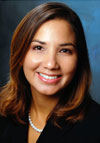 Cecilia
Chi-Ham Cecilia
Chi-Ham
Director of Research Planning
HM.Clause
“The secret to
building a successful career is to find the
cross-section of your skills and your passions.”
As part of the global management team for
Research & Development, Cecilia is responsible
for building R&D strategy and identifying new
opportunities for innovation. Cecilia also
provides direction for the UC Davis – HM.CLAUSE
Life Science Innovation Center, a collaboration
between the University and HM.CLAUSE that
facilitates innovation by giving start-up
companies the opportunity to thrive. Prior to
joining HM.CLAUSE in 2014, Cecilia served as
Director of Science and Technology at the Public
Intellectual Property Resource for Agriculture,
a nonprofit organization housed at UC Davis. The
aim of the organization was the transfer of
agricultural technology and intellectual
property to developing countries and the private
sector. Cecilia earned her BSc in Environmental
Science and Organic Chemistry and a PH.D in
Biochemistry before doing postdoctoral research
at Michigan State University and UC Davis. She
is a Registered Patent Agent with the United
States Patent and Trademark Office.
Having grown up in Honduras, Cecilia has always
been connected to the agricultural community,
but her interests were piqued while at UC Davis
when she had the opportunity to work with
Francois Korn and Kent Bradford on developing
the idea for Seed Central. That project is what
first exposed her to the seed industry. Having
worked at the University before, and now working
for the seed industry, what fascinates her most
is seeing how the innovations that come from
public and private research complete the circle
of development when they are transformed into
new products, such as new seed varieties for
farmers around the world.
Cecilia takes pride in working for the seed
industry because it is inherently important in
the quest to feed the planet. Coming from a
developing country, she is keenly aware of the
significance that agricultural productivity
holds for economic growth and national security.
As such, she finds it rewarding to work for a
company that provides reliable and innovative
seed products to farmers. Moreover, she
appreciates the values that HM.CLAUSE and its
parent company uphold, as well as the company’s
commitment to people, be they employees, farmers
or consumers.
Her advice for job-seekers is to consider a
career at a company such as HM.CLAUSE that
offers employees the ability to contribute to
the success of the company while also
facilitating professional and personal growth
opportunities. |
|
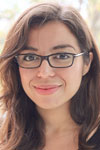 Leonela Carriedo Leonela Carriedo
Ph.D. Student, Plant Biology
I began my
college years as a pre-med major. I am a first
generation college student, and at the time, I
thought that the only reason people went to
college was to either be a doctor, a lawyer or
an accountant. I sought mentorship from many
senior undergraduate students and they all
recommended that I pursue research internships
in order to make my medical school application
more competitive. I heeded their advice,
however, I had no clue what doing research meant
or that one could even pursue a career in
science. As a requirement for my degree, I had
to take various biology courses, including a
"Plant Diversity" class. While at first, I was
not particularly excited by the idea of taking
the course, I was quickly stunned and marveled
in the complexity beauty of plant form and
function. I gained a deep appreciation for
plants, and I felt like I had gained intimate
knowledge of something which people usually take
for granted.
The following year, I had the opportunity to
work at a hospital, and I quickly realized that
the medical profession was not a good fit for
me. At that point, I knew that I enjoyed
research and I still had a profound curiosity
for plants. The following semester, I changed my
emphasis of study to Plant Biology. My courses
in plant taxonomy and plant physiology piqued my
interest in further learning about the genetic
control of plant form and development, and that
following year I started an internship in a lab
at the Carnegie Institution's department of
Plant Biology in Kathryn Barton's lab, learning
how to manipulate gene sequences that control
leaf polarity.
That experience was pivotal in my consideration
of science as a possible career, and I was
encouraged to apply to several graduate
programs. I was most drawn to UC Davis and to
Julin Maloof's lab for his work in understanding
how the environment impacts plant development.
At the time I joined the Maloof lab was
transitioning towards working with tomato as a
model crop system. Working with a crop was
important for me, and I threw myself into
projects revolving around understanding complex
environmental stress responses at the
physiological and genetic level.
Working within a model crop system has pushed me
to learn more deeply about domestication, how
wild species are used for crop improvement and
also the challenges we will face attempting to
improve our food security in our changing
climate. My graduate experience has exposed me
not only to a variety of research topics and
experimental approaches, but also to how
decisions about research are made. Part of my
graduate education has been funded by the Office
of Research at UC Davis under the Research
Investments in Science and Engineering (RISE),
that funds and encourages UCD scientists to work
on high impact interdisciplinary projects that
could open the door to new avenues of research,
patents or external funding opportunities. This
exposure motivated me to learn more about how
research can be moved beyond the lab and be
commercialized. These experiences prompted me to
consider a career in the seed industry. Through
several informational interviews with scientists
within the seed industry and visits to local
seed companies, I gained an appreciation of the
high level of research and the collaborative
approach in this industry, and I am excited to
explore career opportunities in the seed
industry. |
|
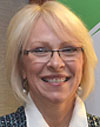 Risa
DeMasi Risa
DeMasi
Partner,
Grassland Oregon
Chair,
American Seed Trade Association
(2015/2016)
From as
young as I can remember, I wanted to own
my own business and to express myself
creatively.
I initially explored the fashion
industry, but unbeknownst to me at the
time, my future seemed to be rooted in
my past, on the family farm.
I found myself intrigued when two
friends presented an opportunity with a
fledgling seed company, and soon
recognized its creative and
entrepreneurial potential.
What followed was the compilation of
small seemingly inconsequential
decisions over time, fortunate
opportunities, and a habit of throwing
myself off (proverbial) cliffs to see if
I will land.” This resulted in an
altogether different creative career and
ownership, with two amazing and
brilliant partners, of my own seed
business.
In 2013 I was invited to take a
leadership role in representing the
cover crop industry in ASTA becoming the
first woman on the board, and now have
the privilege of serving as chair of the
association this year. In this position,
I’ve been able to travel worldwide
representing the US seed industry and
uncovering opportunities and challenges
for growth and collaboration to meet the
growing global demand for food, feed,
fuel and fiber This adventure has
provided some of the most incredible
experiences and friendships imaginable.
I love that what I do makes a difference
in the world, I love that I work with
and cross paths with some of the
brightest minds and leaders, and I love
that opportunities continue to abound
for anyone who opens their mind to
possibilities. |
|
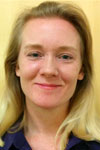 Tamara Miller Tamara Miller
Ph.D. Student, Crop Improvement
Some of my earliest memories as a kid
growing up in Placerville, California, are of
learning about plants and tending roses with my
grandfather. He was a master gardener and
instilled in me a love of botany, gardening, and
in general an appreciation for the natural
world, which sticks with me today. Even though
later when I went off to college at U.C.
Berkeley, I initially wanted a career in
medicine, I decided to pursue a path in genetics
and plant biology because I remembered that even
as a young person I found the extreme diversity
and complexity of plants to be fascinating. I
wanted to focus on how to leverage that
diversity in a way that would impact human
health.
After earning a B.S. in Genetics and Plant
Biology I worked on a project at U.C. Berkeley
to improve the nutritional quality of sorghum, a
staple crop in Africa and Asia and one of
importance for animal feed in the U.S., using a
biotechnological approach. Even though the work
I did on sorghum represents a possible way that
genetic engineering can be applied to improve a
trait that impacts human health, crop
improvement as a discipline includes a much
broader set of tools. In 2012 I joined the Gepts
lab at U.C. Davis to learn about how genomics
and plant breeding can be applied to improve
crops, or more specifically, beans. I earned a
M.S. degree in 2014 while working with the
African Bean Consortium, which seeks to utilize
next generation genetics technologies to improve
disease resistance and overall yield in common
beans grown in East Africa. In the near future I
will be working on a Ph.D. in the Gepts lab,
focusing on the genetics of resistance in beans
to Angular Leaf Spot, a disease which affects
many bean growing regions in Africa and Latin
America.
I feel that many of the opportunities I have had
throughout my life have been due in part to hard
work, but also more importantly, to the
influence of several fantastic mentors I have
had. I may not have realized my true passion for
plants and for nature had it not been for the
guiding influence of my grandfather early in
life, nor might my interest in bolstering human
health through food production have been so
strong had it not been for my mentors, who took
it upon themselves to educate me about possible
career paths I could take in plant science. I
feel truly fortunate to be at U.C. Davis,
learning about crop improvement, and besides
following a career path in plant breeding, my
imperative is to pay forward what my mentors did
for me by educating young people about career
paths in plant science and fostering a
collaborative attitude about solving issues
related to crop production. |
|
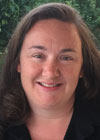 Donna
Harris Donna
Harris
Tomato Pre-Breeder
Bayer Crop Science Vegetable Seeds /
Nunhems USA
I grew up on a
small beef cattle farm near Athens, Georgia
where my dad was a part time farmer who raised
wheat and soybean and full time research
professional at the University of Georgia in the
soybean breeding program. Thus, I developed a
love for agriculture early in life. I chose to
attend Georgia Tech after high school for
mechanical engineering, but decided after a year
and an internship to come back home to UGA and
get my B.S. in Crop Science. I also obtained my
M.S. and PhD at Georgia in Plant Breeding,
Genetics, and Genomics. For five years, between
my masters and doctorate, I was a corn breeder
in industry.
Since July of last year, I have been with Bayer
CropScience Vegetable Seeds as a tomato
prebreeder located in Acampo, CA. It has been a
fantastic experience thus far! I have enjoyed
the change and the challenge of moving from row
crops to vegetables. I also love the prebreeder
role. In my opinion it is a great combination of
academia and industry breeding. I have the
opportunity to support breeding through the
utilization of unadapted germplasm for
gene/allele discovery work.
It has been said ……. “the road to happiness is
to fully develop your abilities and then apply
them to doing good”. I can’t imagine a better
place to be than the “field” we are in. |
|
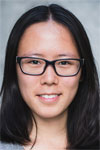 Mengyuan Xiao Mengyuan Xiao
Ph.D. Student, Horticulture & Agronomy
I am
interested in crop genetics and
breeding. I chose my major because I
enjoy exploring the mysteries behind
plant life and I also hope my future job
could potentially contribute to some
global critical issues like food
shortage. Crop breeding is one of the
most powerful tools to solve this
problem, and genetics is the base for
modern breeding. My career aspiration is
to work as a crop breeder or genetics
researcher in seed industry or public
research institution. |
|
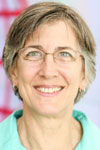 Renée
Lafitte Renée
Lafitte
DuPont Fellow
Woodland
Research Station Lead
DuPont
Pioneer
Thank you for the opportunity to share
my story with you. I started my career in plant
science with a clear intention – to help
stabilize global food production and reduce
poverty. That may sound overly ambitious today,
but famines were frequent from 1960-1980, and I
had the example of pioneers like Norman Borlaug,
M.S. Swaminathan, and others as role models. My
training included a BSc in Botany, MSc in
Agronomy, and PhD in Crop Physiology, followed
by a post-doctoral position at the International
Maize Improvement Center (CIMMYT) in Mexico.
This is the center where Dr. Borlaug did his
work on shuttle breeding for the semi-dwarf,
disease-resistant wheat cultivars that supported
the Green Revolution. After 9 years in Mexico, I
moved to the International Rice Research
Institute in the Philippines, where semi-dwarf
rice varieties were developed that enabled food
self-sufficiency in Asia. For the next 11 years,
I continued to live my dream of doing
agricultural research in partnership with
national programs to improve livelihoods for
resource-poor farmers.
In 2005, I accepted a senior scientist position
at Pioneer Hi-Bred International (now DuPont
Pioneer) here in California. Pioneer also has a
global mandate, and research at Pioneer enhances
local productivity and affects the global export
markets for staple crops like maize and soybean.
I have found that the private sector has an
exceptional level of focus and ability to
deliver on goals. My work is around in-field
phenotyping for stress tolerance, and the
techniques we have developed have enabled the
development of products that are grown across
millions of acres. Crops that are resilient in
the face of uncertain climate trends are
critical to ensuring global food security, and
the seed industry is a key player in ensuring
their development and deployment. When you add
to this the pace of technological advances in
genetics, phenotyping, and information
management, the seed industry is clearly both an
exciting and highly relevant place to work. |
|
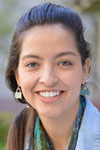 Jenna Gallegos Jenna Gallegos
Ph.D. Student, Plant Biology & DEB
I grew up on a
cattle ranch in a small community of dry-land
farmers in Eastern Colorado. My fascination with
genetics began with punnett squares in middle
school, so I decided to major in biology at the
University of Colorado in Boulder. In a freshman
genetics lab, I was required to lead a
discussion on science ethics and was assigned
the topic of genetically modified organisms.
Given my rural background, I was thrilled by the
prospect of using molecular biology as a tool to
help farmers improve yields and increase the
nutrition of staple crops while conserving
resources and reducing environmental impacts.
Upon enrolling in the plant biology graduate
group at UC Davis, I found a community of
scientists committed not only to making
discoveries in agriculture, but also to sharing
those discoveries through extension and
outreach. As a woman from an agricultural
background, I am passionate about engaging both
concerned consumers and hesitant farmers on
topics of new agricultural technologies.
Opportunities for collaboration between academia
and industry at Davis such as the Seed Central
events and the Designated Emphasis in
Biotechnology program have introduced me to the
type of fascinating research occurring at
biotech companies, and the passion for
communication and interdisciplinary
collaboration among industry researchers. I plan
to explore career options in both industry and
academia that provide opportunities for science
communication and outreach as well as novel and
applicable research in agricultural
biotechnology.
|
|
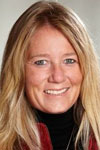 Jana
Mentzer Jana
Mentzer
US Row Crops Commercial Production
Lead
Monsanto Company
I have the
greatest job in the world! I work in an industry
that is always changing & improving, utilizes
cutting edge technology, with farmers that
passionately care about what they do and want to
help the world have a safe and secure food
supply for generations to come. Now 20 years
after my bachelor’s degree, I’ve had multiple
chances to go do something else. No matter how
many great opportunities come my way, there
isn’t a single one of them that can compete with
this industry what I can do with Monsanto.
Getting here involves some strategic thinking
and a lot of serendipity. My summer job as a
teenager was detasseling corn; a short duration,
high paying job…both things that teenagers look
for in a job! It is also a lot of work in a hot
muddy corn field in July. After graduation, I
proudly declared I would never touch a corn
field again.
I became a chemical engineer from Iowa State and
obtained a great job working for Monsanto making
RoundUp®. I had the opportunity to move to St.
Louis to be the US Production Planner for all
our herbicide products and had full intentions
of ultimately moving into further roles in that
business and using my chemical engineering
degree that I toiled to obtain. Then serendipity
starts to enter the picture. While pursuing my
MBA, Monsanto acquired DeKalb and Asgrow Seed
businesses, among others. I was looking for a
next role that would stretch me, while keeping
me in St. Louis to finish my degree. A hallway
conversation later and I was moving into our
DeKalb business as the first female in our corn
production team and first without an agronomic
background. I really thought it would be a 3
year experiment that would clearly show I needed
to go back to chemical engineering.
Fifteen years, seven locations, and four
countries later; I am working in seed production
and loving it. I’ve had the opportunity to be a
process expert, a site leader, a planner, a
large team leader in Canada, US, Argentina, and
Chile. I have worked with corn, soybeans,
canola, and 23 different vegetable species. Who
knows what the next years will bring for this
industry and my career, but I can’t wait to find
out! |
|
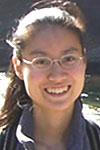 Weiyuan Zhu Weiyuan Zhu
Graduate Master, Horticulture and Agronomy
I have always
been a nature lover and wanted to solve
sustainable development issues using creative
approaches. In my previous research and work
experiences in ecology, horticulture and
international agricultural development, I have
developed real-world understanding in food
security, environmental conservation and global
change. Serving in the public and non-profit
sectors, I wondered how the private sector
tackled the issues.
Last year, as a Business Development Fellow at
UC Davis’ Graduate School of Management, I
extensively explored entrepreneurship and
innovation management on large scale. The
mindset transition from science to business was
huge, but I enjoyed being stretched and
embracing new commercial ideas. I realized the
great potential modern technology has to
contribute to the new economy. More
specifically, in the food and agriculture
sector, I identified the seed industry as the
next field that I would explore.
Seed Central provides unique opportunities for
people from academia and industry to meet. The
presentations, field tours and networking events
with industry professionals have motivated me to
learn more about what the industry has to offer
for my professional and personal growth.
|
|
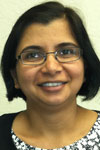 Sonali
Mookerjee Sonali
Mookerjee
Lettuce Breeder
Enza
Zaden
I grew up in a small town in India and
no one in my immediate or extended family was
associated with the seed industry. Naturally I
had no idea that plant breeding could be a
career option and I definitely didn’t have any
plans of moving to USA and working for major
global seed companies. As expected, my decision
to continue education in plant sciences was very
‘unusual’ and strongly discouraged.
After completing a Masters (coursework)
in India, I moved to Australia (University of
Adelaide) to do a thesis-based Masters. My first
exposure to plant breeding was in Adelaide when
I was working as part-time Research Assistant
for fruit breeding projects. Later on, I moved
to the US to work on my PhD and I spent a
significant amount of time working with breeders
at the University of Florida and Michigan State
University. I was a student participant of a
consortium of Rosaceous Breeders and Molecular
Scientists (RosBREED), working on improvement of
Rosaceous crops, and that opened doors to
interacting with many breeders working on other
fruit crops.
When I was close to graduating from
Michigan State University, like most graduate
students I was faced with the choice of working
in the industry or academia. At that time I had
the opportunity to spend four months working on
a Graduate Internship at Monsanto’s Vegetables
Division, where I interacted with several
breeders and got to experience some aspects of
working in the seed Industry. My internship
experience was so positive that I had no second
thoughts about joining the seed industry.
After completing my PhD I joined
Monsanto R&D IT, but soon I realized that I
wanted to have a career in field breeding. I
moved to a job as Lettuce Breeder with Vilmorin
(Groupe Limagrain). Eventually I moved to Enza
Zaden Research USA to continue as a Lettuce
Breeder. Currently I work on breeding romaine
and green leaf lettuce types for the USA market.
During my short experience in the seed
industry I have met some amazing people who are
great advisors, mentors, and friends, and whom I
value. Overall my experience in the seed
industry has been positive and I will encourage
women (and men) graduate students to consider a
career in the seed industry. I have experienced
workplaces with wide contrasts in the ratio of
men vs. women and I agree that having strong
qualified women in management roles makes a
positive difference. In my opinion, as
workplaces start accommodating a more diverse
group of employees (diversity in gender,
nationality, etc.), women and men will be
welcomed and accepted as individuals based on
their qualifications and abilities, and not
because of their gender and other attributes.
|
|
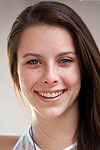 Valerie Wuerz Valerie Wuerz
Undergraduate Junior, Plant Biology
Throughout my
childhood, my family worked to spark my
curiosity and foster my desire for exploration.
Now in college I am eager to continue on this
path through research and learning.
I currently
work in a plant pathology lab with professor
Rizzo, where I am able to gain more insight into
what options I have in my future.
As I complete
my undergraduate college degree, I plan to
continue learning more about how I can use the
knowledge I have gained to address the different
issues that we face as a community. |
|
|
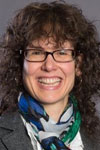 Iris Tzafrir Iris Tzafrir
Commercial
Product Lead
Chair, Women’s Leadership Network
Syngenta Seeds, Inc
I grew up in a small agricultural
community in the northern Negev desert of
Israel. My community raised barley and wheat,
vegetables and citrus trees. Growing up, I did
not plan to explore a career in science and
technology since I did not have role models to
follow such a path. It was thanks to my high
school teacher that I fell in love with biology.
During my first degree, I came to realize that I
was interested in doing science that can
translate into commercial applications.
In graduate school I purposely chose a plant
pathology project with field application
potential. Studying how a virus moves from cell
to cell, I discovered a segment of the virus DNA
that can drive transgene expression in plants
and went on to patent and license the invention.
This was my first exposure to a key step in
translating science for commercial
applications--securing intellectual property and
working with partners who are in position to
develop a nascent technology into products.
Since graduation I worked in several roles in
the agriculture industry: research, licensing
and intellectual property, commercial
negotiation, and marketing. For about ten years
I worked with multi-functional global teams to
negotiate and manage transactions and alliances
between my company and universities, startups
and other companies. In the last two years, I
moved to brand management of a corn product
portfolio and work closely with both the sales
and research teams. The most interesting roles
are the ones that require collaboration of
experts from different areas.
A couple years ago I was asked to serve as the
Chair of our Women’s Leadership Network at
Syngenta, an opportunity that allows me to share
my and others’ experiences with women who are
interested in building their career in
agriculture. |
|
|
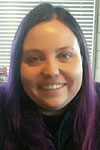 Randi Jimenez Randi Jimenez
Ph.D. Student, Horticulture & Agronomy
I earned a BSc
in Plant Biotechnology. I chose to study
biotechnology out of high school because it was
my favorite class in my favorite subject,
biology. As for the plant emphasis, I have
always wanted to work with plants since I was a
little kid.
While working on my BSc at UC Davis,
I took plant breeding as an elective because the
lab sounded fun, and between the course itself
and the field trips, I was hooked. Several
faculty members helped me make my decision, and
ultimately I wound up as a MSc student in
Hort&Ag. With the help of my MSc advisor, I was
able to write a grant and earn a National
Science Foundation Fellowship, which allowed me
to continue on to a PhD program.
When I finish
my PhD, I hope to enter the seed industry as a
plant breeder. I love the incorporation of
diversity into programs, and I always wind up
picking out fruits with unique sets of traits as
my favorites. |
|
|
|

